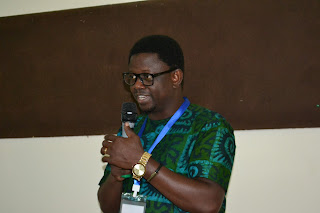 |
| The participants at the Knowledge Managment training workshop on Data Capture &; Monitoring/Reporting on Malabo Commitments |
By Natasha Mhango
The commitments
of the 2014 Malabo Declaration on Accelerated Agriculture Growth and
Transformation for Shared Prosperity and Improved Livelihoods, come to an end
in 2025 which is literally next year. The Malabo Commitments, as they are
usually referred to, were the product of a 2014 African Union Heads of State
meeting in which member states committed to fostering agriculture -led
development in order to reduce poverty and end hunger in Africa by 2025.
This targeted approach saw various African countries also commit to allocating 10% of their public expenditures towards financing agriculture, boosting intra-African trade in agricultural commodities and services; as well as ensuring regular a biennial review process to track and monitor the progress being made.https://www.resakss.org/sites/default/files/Malabo%20Declaration%20on%20Agriculture_2014_11%2026-.pdf
While a
significant number of signatories to the Commitments are not on track in
achieving some of the set targets, they have however made significant progress
in the right direction.
During a recently held training workshop on Knowledge Management and Monitoring /Reporting of Malabo Commitments that was held in Chisamba, Zambia,
brief analyses of Biennial Review Reports (BRRs) from various countries indicated that the political will to transform the agriculture sector remained aggressive as evidenced by the existence of working policies and strategies designed to promote agriculture-led development.The training
workshop which was facilitated by the Centre for Coordination of Agricultural
Research and Development for Southern Africa(CCARDESA); and the E.U funded
CAADP-XP4 brought together consultants, knowledge management experts, the
media, the youth and some government officials from Zambia’s ministries of
Agriculture and; Fisheries and Livestock to analyze the status of the Malabo
Commitments in the SADC Region.
Of
particular importance were issues surrounding harnessing data and information;
and connecting the information with people who need it.
Presentations
from the event based on some countries’ BRRs indicated that most countries had
established appropriate policies and strategies aimed at reducing poverty and
ending hunger which was indicative of progress into the desired direction.
However, there were some concerns raised on the accuracy of the data that was
used to measure this progress.
There was an
assertion that a significant amount of progress being under-reported was
brought to fora as the consensus recognized the unavailability of data and/or
inaccessibility to data during the compilation of the BRRs.
Dr. Martin
Muchero - an international consultant with expertise in rural development and
agriculture - was one of the participants at the training workshop that was
held and agreed with this assertion to a valid extent.
He
highlighted the need to network and share information through consistent
reporting – a characteristic that was evident in countries like Rwanda and Egypt
that were reportedly on track with meeting the Malabo Commitments.
 |
| Dr. Martin Muchero - International consultant |
“Other
countries that have done well are those countries that have put together good,
sound agriculture information management systems,” Dr. Muchero said
He added
that reporting on investment in agriculture for instance needed to be broader
than simply reporting on increases in farm production.
"Even
constructing a road in the rural area that facilitates the farmer to access the
market - that is investment in agriculture…So let’s not think about the 10%
investment [commitment to agriculture financing] as just what goes into the
Ministry of Agriculture, let’s think about the small contributions that are
being made at the local community level. That all counts too,” Dr. Muchero
said.
Mr. Benjamin
Abugri – the Knowledge Management and Outreach Officer for Forum for
Agriculture Research in Africa(FARA) echoed the need for key stakeholders to
network in reporting their individual countries’ progress towards the Malabo
Commitments.
 |
| Benjamin Abugri - KM an Outreach Officer for FARA |
“Knowledge
management is not only about collecting and sharing information but also about
connecting people to the information,” Mr. Abugri highlighted.
As the adage
goes, if it’s not written down, then it
didn’t happen.




No comments:
Post a Comment